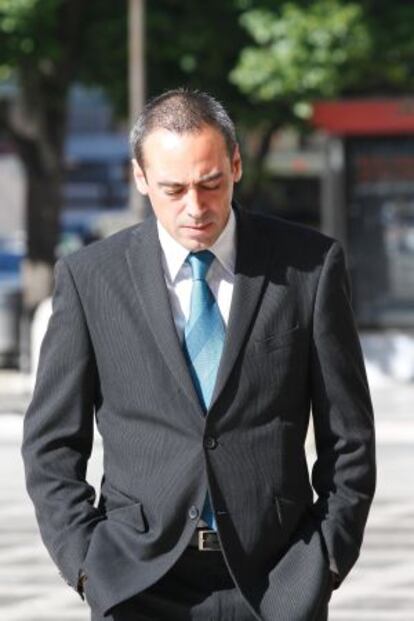Former judge avoids jail time for bribery conviction in money-laundering case
Ex-Marbella magistrate let three suspects walk free in 2007 for 60,000 euros

A former Marbella judge who was sentenced to two years for accepting a 60,000-euro bribe to drop a money-laundering case in 2007 has avoided jail time. Francisco Javier de Urquía will be allowed to remain free after he paid his fine and was disbarred for 17 years, the Andalusia regional High Court ruled last week.
The decision, which will be made official on Wednesday, will still have to be confirmed by the lower court that imposed the original jail sentence on Urquía.
Urquía, the son of a former Alicante judge, was convicted on bribery and derelict of duty charges stemming from the so-called Hidalgo case, a multi-million-euro money-laundering scheme involving an international ring that operated out of Marbella. He shelved the case against the defendants — one being a close friend — in May 2007 after receiving the 60,000-euro bribe.
In February, the Supreme Court confirmed the sentence against Urquía but the fired judge asked to remain free. Under article 81 of the Penal Code, defendants who are sentenced to two years or fewer and do not have prior criminal records can obtain a jail waiver if they have paid their fines and met any civil restitution. In the Urquía case, there was no restitution imposed, but he was ordered to pay a 69,000-euro fine, which he paid in full. He was also banned from the legal profession, in particular from holding a bench seat, for 17 years.
Roca paid off Urquía to prevent a TV station from broadcasting a program about his shady wealth
This was Urquía’s second conviction. The former judge had accepted a 73,800-euro bribe from Juan Antonio Roca, the alleged architect of the massive multi-million real estate scam in Marbella that was the origin of the Operation Malaya case in 2005. Roca had paid off Urquía in exchange for a ruling that prevented a television station from broadcasting a program about his shady wealth. Following February’s decision by the Supreme Court, the General Counsel of the Judiciary (CGPJ) legal watchdog officially fired Urquía.
Two other defendants who were convicted along with Urquía — Azan Khan and Arnaud Albouhair — have also escaped jail time. They were sentenced to one and two years, respectively. The court also decided to apply the waiver, as long as they do not commit any more crimes in the next three years. The two defendants requested that they be allowed to pay their fines in installments, to which the Andalusia High Court also agreed. From June, Albouhair will have to begin paying his four installments of 15,000 euros each to cover the 60,000-euro fine, while Khan will begin making 10,000-euro payments until he pays off his 50,000-euro fine.
In April 2007, Urquía received 60,000 euros from Khan, one of the defendants in the Hidalgo money-laundering case, in exchange for allowing him, his wife and son free on bail. According to the court details of the case, Albouhair received the money from a nephew of Khan named Tariq, when the uncle was already in prison. The money was given to Urquía. After he got the cash, on May 2, 2007 Urquía reversed the custody orders that had been issued two weeks before, arguing that Khan was going to be tried on the same charges in Belgium, his country of residence.
The court determined that Urquía had deliberately obstructed justice by not demonstrating that the amount of money that Khan was charged with laundering — 136 million euros — was identical to the amount he was charged with channeling in Belgium.
Tu suscripción se está usando en otro dispositivo
¿Quieres añadir otro usuario a tu suscripción?
Si continúas leyendo en este dispositivo, no se podrá leer en el otro.
FlechaTu suscripción se está usando en otro dispositivo y solo puedes acceder a EL PAÍS desde un dispositivo a la vez.
Si quieres compartir tu cuenta, cambia tu suscripción a la modalidad Premium, así podrás añadir otro usuario. Cada uno accederá con su propia cuenta de email, lo que os permitirá personalizar vuestra experiencia en EL PAÍS.
¿Tienes una suscripción de empresa? Accede aquí para contratar más cuentas.
En el caso de no saber quién está usando tu cuenta, te recomendamos cambiar tu contraseña aquí.
Si decides continuar compartiendo tu cuenta, este mensaje se mostrará en tu dispositivo y en el de la otra persona que está usando tu cuenta de forma indefinida, afectando a tu experiencia de lectura. Puedes consultar aquí los términos y condiciones de la suscripción digital.









































